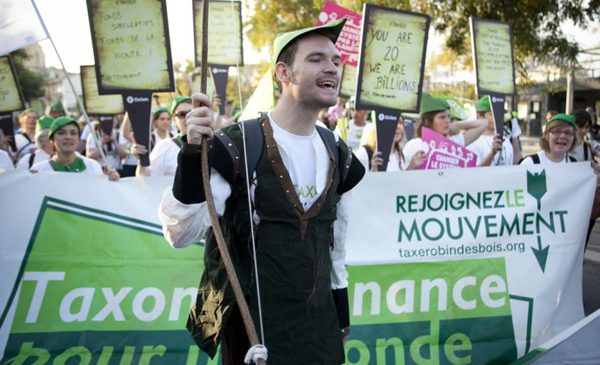
At the G20 this week, a growing group of G20 countries from South Africa to Brazil backed the Robin Hood Tax, and the link between the Robin Hood Tax and fighting poverty and climate change became clearer than ever. Momentum is building and leaves leaders like David Cameron who opposed the tax looking increasingly isolated having sided not with the 99% suffering the effects of the economic crisis, but the interests of a privileged few in the financial sector.
As expected, Bill Gates presented an excellent report calling for a ‘Robin Hood Tax’ on financial transactions to raise much-needed money for poor countries struggling to cope with the economic crisis and climate change. Bill Gates’s report is a game changer – it shows that a tax is both feasible and desirable but crucially that countries can no longer hide behind the excuse that financial transaction taxes needs to be global to work.
Whilst G20 leaders could have gone further, this is far from the end. Events in recent days, with Mr Gates’ call being supported by G20 members from France, Germany, Argentina, South Africa and Brazil and by senior figures from the Archbishop of Canterbury to Jeff Sachs, it is clear that momentum is building behind an idea whose time has come.
David Cameron remains one of the key blockers in the international process with even the USA and Russians moving, so it’s vital we keep up the pressure on the UK government ahead of EU talks next week and UN climate talks in South Africa in December. And here in the UK, as the economy fails to pick up and cuts to public services continue to hit ordinary people, we need to keep the pressure on Cameron – this is Plan B.
We are now part of a movement of millions. From church services in St. Paul’s to nurses on Wall Street, people everywhere are saying enough is enough. A Robin Hood Tax remains the best option on the table to start making the financial sector work for people, not just for profit.
The extraordinary actions of people around the world mean this fight can be won. Yesterday, as leaders met in Cannes, thousands of nurses marched in New York and Washington to try to convince President Obama to put the interests of Main Street ahead of the titans of Wall Street. Some of those nurses had travelled all the way to Cannes from South Korea, Spain, Ireland and America with one simple message: enough is enough, and to ask governments to do what they do everyday – put people, not profit first with a Robin Hood Tax. A glimpse of their determination came in a story told away from the media spotlight. One nurse visited her progressive Congressman to ask him to support the tax, and got the response ‘you nurses, you should lower your ambition.’ She replied: ‘Would you like me to do that when you come in for heart surgery?’
Tim Noonan of the International Trade Union Congress presented at the G20 and went straight to the heart of the argument, saying “Governments should have a contract with their people, not with the banks. When you strip away the technical arguments about derivatives, high frequency trading and credit default swaps, it really is simple: a tiny tax on some of the richest people in the world that could raise billions to help the poorest.”
As an economic storm once again threatens to engulf the world economy, all eyes will be on world leaders to fix the system; by curbing casino capitalism Robin Hood taxes will help do that, in addition to raising tens of billions to help the world’s poorest people.
Ideas this good don’t come along every day. And when they do, they’re too powerful to ignore.
First published on Robin Hood Tax